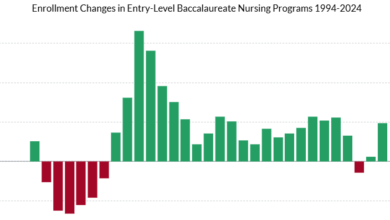Labour pledges to ‘clear’ NHS waiting list backlog within five years

Weekend and evening clinics will be among the core methods used to bring down the NHS waiting list backlog for elective care within five years, according to the Labour Party, if it wins the general election.
Labour has tonight announced what it called the party’s “first steps” for how it would bring an end to the current health service waiting list backlog over the next five years, should it form the next government.
“The first step of my Labour government will be to cut NHS waiting lists”
Kier Starmer
The NHS waiting list in England currently sits at around 7.5 million cases, which Labour claimed was set to hit over 10 million if the Conservatives won the election and stayed in power.
The Labour pledge to clear the backlog within five years was made today during a campaign visit to the West Midlands by party leader Sir Keir Starmer and shadow health secretary Wes Streeting.
Labour said it planned to achieve this goal though, as a first step, 40,000 extra appointments, scans, and operations a week, during evenings and weekends.
In addition, it said it double the number of scanners to diagnose patients earlier and deliver the “biggest expansion of NHS staff in history”.
It would also use spare capacity in the private sector, free of charge to patients, and reform the NHS to get more out of the service for what was put in, said Labour.
The party said the extra appointments and scanners would cost £1.3bn and claimed they would be paid for by “clamping down on tax dodgers and closing non-dom tax loopholes”.
The NHS Constitution guarantees patients treatment within a maximum wait of 18 weeks. However, this target has been missed every month since February 2016, noted Labour.
The number of patients waiting longer than 18 weeks today stands at 3.2 million, almost half of the total waiting list, with more than 300,000 patients having waited more than a year.
Sir Keir said: “The first step of my Labour government will be to cut NHS waiting lists, clearing the Tory backlog.
“We will roll up our sleeves to work with NHS staff, not against them. We will stop the anxiety of wondering if an ambulance will come on time. We will bring back the family doctor.”
Wes Streeting, Labour’s shadow health secretary, added: “If the Conservatives get another five years then nothing will change, the crisis in the NHS will get worse, and waiting lists will hit 10 million.
“We will deliver an extra 40,000 appointments a week at evenings and weekends, the first step on our mission to beat the Tory backlog,” he said.
Additional clinics have been mentioned before by Labour, which previously pledged to cut NHS waiting lists in England by paying nurses and other staff to provide additional out-of-hours appointments.
Speaking at the Labour Party conference in October, Sir Keir said he would put £1.1bn into the NHS to pay for staff to do overtime on evenings and weekends so more procedures can be carried out.
Responding to the latest election pledge, executive director of Royal College of Nursing in England, Patricia Marquis, said: “Nursing staff will be pleased to hear a commitment to bring down waiting lists.”
However, noting the ongoing staffing shortages, she said: “Across NHS settings, nursing staff provide the vast majority of care but we’re missing tens of thousands.
“Labour’s plan to tackle the backlog is urgent and necessary, but it cannot simply rely on asking an already burnt-out workforce to do more with less,” she warned.
Ms Marquis called for “more detail” on Labour’s promised historic expansion of the NHS workforce, highlighting the dual problems of staff leaving the service and falling applications to study nursing.
Matthew Taylor, chief executive of the NHS Confederation, which represents managers, said health service staff had been working “incredibly” hard to provide safe and timely care all year round.
“To make inroads in tackling the waiting list, we need long term planning, which means the right support and resources to ensure the extra beds opened this winter continue to be staffed, as well as opening new theatres to keep tackling the backlog,” he said.
He added that NHS leaders would also like to see capital funding boosted by an extra £6.4bn and a promise to fund the existing NHS workforce plan, so they have enough staff to treat patients.
Saffron Cordery, deputy chief executive at NHS Providers, said staff across hospital, mental health, ambulance and community services were already working “flat out” to reduce record-high waits.
“They’ve made hard-won progress in bringing down the longest waits and are delivering more scans, tests, operations and checks – often by working together locally,” she said.
“Rising demand, squeezed NHS funding, the fallout from the pandemic and severe workforce shortages have all taken their toll,” said Ms Cordery.
She added: “If political pledges are going to become a reality, trust leaders know that the next government needs to commit to sustained investment in NHS capital and digital infrastructure, staffing and social care reform – as well as resolving outstanding pay disputes and industrial action.”
Sarah Woolnough, chief executive of the King’s Fund think tank, noted that, in spite of sustained efforts, the NHS waiting list for elective care had remained “stubbornly high” at 7.5 million.
“Long waits for care have been brought down before, but it takes time,” she said. “Clearing the backlog within five years would take real effort and focus.
“Offering weekend and evening appointments for planned treatment and outpatient clinics is a good idea and has already been shown to bring down long waits in parts of the NHS,” she said.
But she cautioned that “scaling this up” would rely on having enough NHS staff to take on the extra shifts, which was not a given when so many reported high levels of stress and burn out.
She added: “Achieving this ambition to eradicate the backlog within five years would almost certainly require a swift resolution to ongoing industrial action.”
“Nursing staff will be pleased to hear a commitment to bring down waiting lists”
Patricia Marquis
Meanwhile, Nuffield Trust think tank chief executive Thea Stein said Labour was right to focus on waiting lists, where progress had been slow and survey results showed public concern was “very high”.
However, she argued that the sum of money being proposed by Labour for spending on equipment would “cover only a limited amount of extra care, not enough for a rapid or sudden improvement”.
She also said it was “unclear” how more private sector capacity could be used without additional funding and how much capacity there was left after rapid recent increases in reliance upon it.
She added: “The problem of NHS productivity, which has fallen for complex reasons since the Covid-19 pandemic and which needs careful national leadership to tackle, also needs to be more of a priority.”





